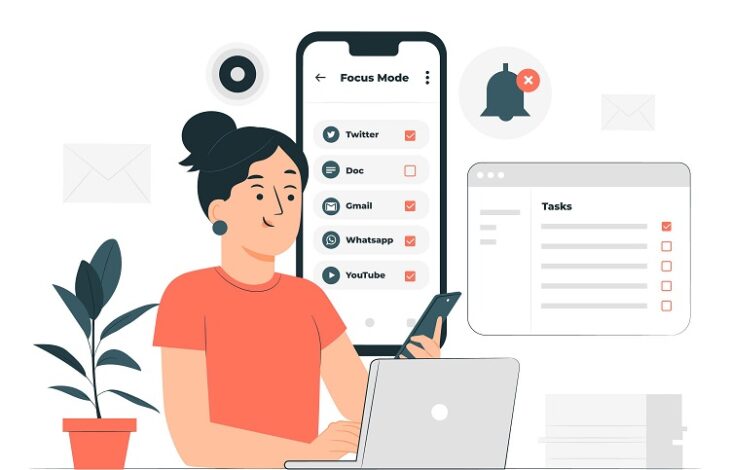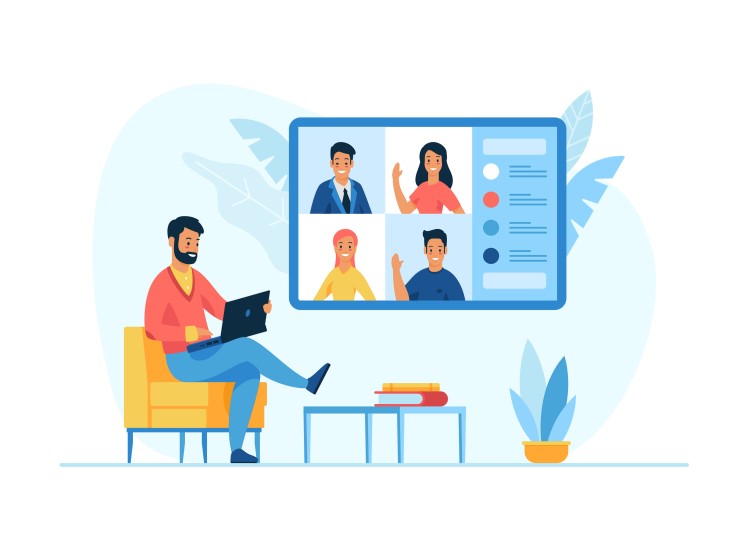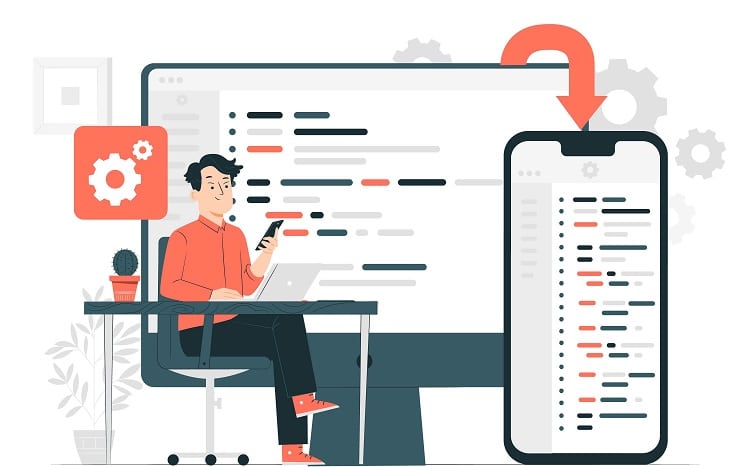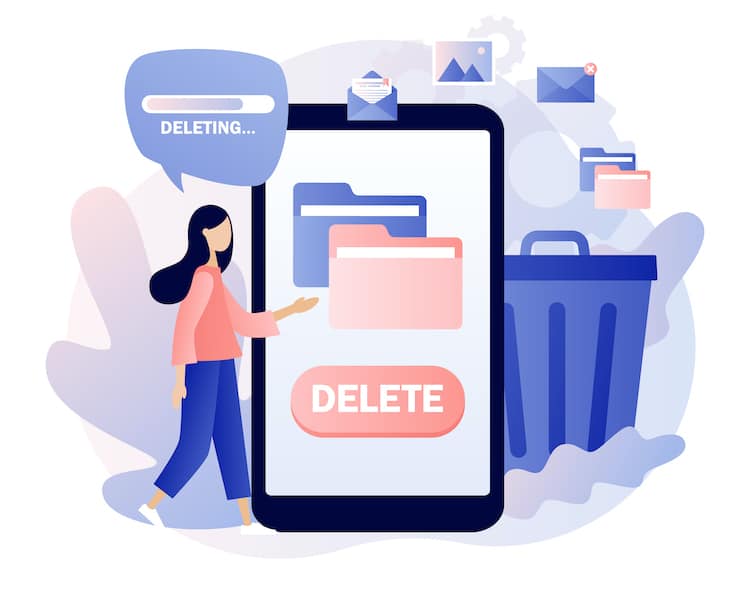Working from home used to be a privilege that few could actually afford to do.
Nowadays, however, working from home is a necessity.
Multitasking has become the new buzzword as parents all over the world adapt to being remote workers, their new normal, and trying to get as many things done all at once as they can, in the little bit of time their fractured concentration can give them.
As a remote worker, you can be expected to be able to jump from one task to another in the blink of an eye, while still managing your home and family life.
This way of working takes a lot of patience and energy from you, especially as you learn to adapt to the forced remote working environments the Covid-19 pandemic created.
Looking after yourself so that you’re fully able to juggle your new full schedule is vitally important to maintaining your physical and mental health, overall well-being, and quality of life.
These 20+ simple yet effective work-from-home self-care tips and practices during the Covid-19 crisis- will keep you feeling great and help you take on whatever life throws at you, with grace, developing some kind of meaningful home-life and work-life balance.
Table of Contents
TogglePlan Your Day In Advance
To create meaning in your daily routine, you need to be aware of what your day demands of you.
Once you have managed your demands, you’re free to do whatever you want for the rest of the day.
The best way to be aware of what your day looks like is to ask yourself these five “W” questions:
- What does my team expect? Briefly check messages from coworkers and team members so you’re aware of anything urgent. Avoid checking your social media early in the morning as this may negatively impact your motivation to follow through on physical activities that keep you fit and healthy. This directly impacts any self-care activity you may have planned as part of your morning routine.
- What needs my immediate attention? This could be the kids, an early meeting, a team crisis, or even yoga with a friend or coworker. Once your immediate priorities are taken care of, you have time to yourself.
- Who am I scheduled to meet with? Now that’s out of the way, you have an idea of what to wear, too.
- When I leave the house, where am I going? Planning your day in advance lets you decide the order of your day, and you may even be able to stop and grab some ingredients for dinner if you plan your route correctly.
- What meals are planned for the day? Meals need not be boring. Experiment a little by loading a video recipe and cooking from scratch. Be present at this moment so your mind gets a break.
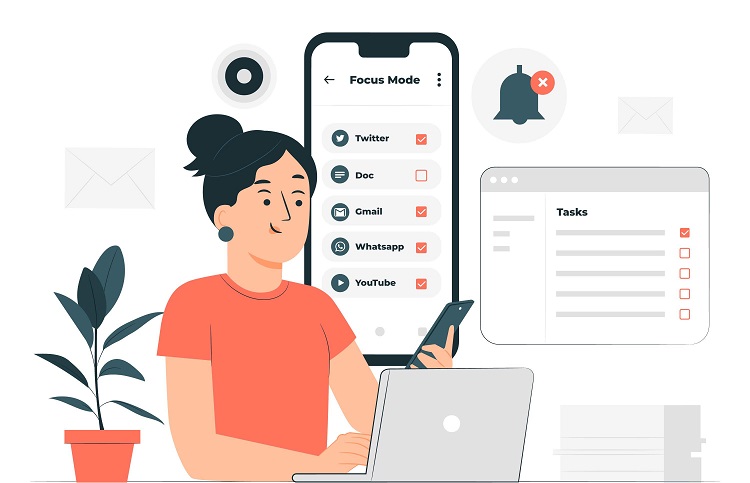
If there is nothing you need to focus on right now, put down your device.
Excessive use of mobile devices could negatively affect your mental health and happiness in the long run, according to a 2017 study from the Journal of Child Development.
Now that you know what the day holds, the rest of the time in the morning is yours.
Make sure some of that time is in front of a mirror.
Looking good and liking what you see in the mirror is not always about vanity; sometimes it’s about self-love and self-appreciation for your good points, too.
Follow A Meaningful Self-care Routine
To create meaning in your daily routine, you need to be aware of what your day demands of you.
Once you have managed your demands, you’re free to do whatever you want for the rest of the day.
Having an extra hour or two to yourself before or after work can make a real difference, not to mention the dreaded commute that’s no longer something to worry about now that you’re an employee working from home.
Use this extra time to be kind to yourself by creating or improving your morning self-care routine so that it becomes more meaningful.
Start The Day With A Self-care Practice
Start the day with a morning self-care practice that includes doing things that help you take care of your body, mind, and soul.
This could be the ritualistic actions involved in putting on makeup, an exercise routine to boost your physical health, or simply taking a shower.
For example, Melinda Gates starts her workday off early with a cup of coffee and quiet time to herself at around 6:30 am.
Melinda’s morning self-care practice includes spiritual reading, yoga, and meditation, followed by some time outside before her workday begins.
Have A Solid Skincare Regime
Masks and makeup, are the two things that clog your skin the most.
The third culprit is mostly unspoken-of, even with friends and loved ones.
This is a lack of a real, reliable skincare regime.
Having a skincare regime is not only good for your skin, but also helps to unclog your pores, minimize fine lines, and keep you looking your best for longer.
It’s also a way to grab a few minutes of personal time because most people don’t interrupt you when you’re “putting your face on”.
And to get the most out of your skincare products, it’s best to apply them in the correct order.
For those who don’t yet have a skincare regime, here are a few tips to get you started:
Cleanse: Remove makeup and oil build-up the old-fashioned way with lukewarm water and a mild soap product.
Make sure the soap you cleanse your face with is fragrance and alcohol-free to avoid stinging your eyes.
Wash as often as you feel the need to, but be sure to follow through on the next two steps to prevent your skin from drying out.
Tone: Washing your face removes surface dirt, and toning removes ingrained dirt.
You can use a soft cotton pad to tone your skin, but be sure to be gentle and not to pull or tug hard at your skin, especially the soft, sensitive skin around your eyes.
Moisturize: Finding and using the right moisturizer for your skin type is essential to maintaining your skin’s glow, elasticity, and balance.
You’ll know you’ve found the right product for you when your skin feels light, natural, and airy, not smothered by a barrier.
Pro tip: Stay kissable. On hot days, the lipstick looks as if you smudged it on, and on cold days it blends into the cracks.
Keep your lips as soft and smooth as Britney Spears does – and prevent cracking – by swapping out your lipstick for lip balm on days that are either very hot or very cold.
Listen To The Music
For some, music sets the mood for the whole day and helps you “zone out”.
For others, music helps you focus on what’s in front of you. In fact, roughly 85% of those polled in a recent survey said that music improved their well-being and productivity.
Music can also alleviate loneliness, increase focus, ward off burnout and stress, and fill your soul (and body!) with dopamine, oxytocin, and serotonin.
These three chemicals balance your mood, create feelings of happiness and joy, and help you feel more connected to the people around you.
If silence is the thing that keeps you focused and happy, that’s okay, too.
When your work-from-home setup feels a bit stale or uninspiring, consider adding subtle touches that refresh your environment and uplift your mood. Incorporating a scent diffuser, like those from AromaTech, can bring calming, energizing, or focus-enhancing fragrances to your space.
Whether you prefer lavender for relaxation or citrus for a mental boost, a gentle aroma in the background can help anchor your mind during stressful days and make your home office feel more inviting.
Eat Healthy Snacks

There are so many foods that are healthy for your body and mind, and the great news is that you can eat them cooked with your main meals, or raw as a healthy snack.
Pack your lunch box with a varied selection of these top 10 vegetables, nuts, and fruits:
- Lemons: Not only are lemons considered to be a superfood, but they’re also anti-inflammatory, detoxifying, and help to cleanse your skin and your system.
Oranges, tangerines, and clementines: Refreshing and packed full of vitamin C, these three citrus fruits can also boost your skin’s health and elasticity by fighting free radicals to prevent skin aging, as well as aiding in wound healing and skin repair. - Berries: Strawberries, blueberries, blackberries, and gooseberries help repair damaged cells and maintain overall health. Berries are known to aid in weight control, regulate the symptoms of diabetes, help maintain healthy blood pressure, and are packed full of natural antioxidants.
- Broccoli: A vegetable that’s crunchy and full of goodness, broccoli is considered to be one of the healthiest foods around. Various studies indicate that broccoli can lower cholesterol, reduce inflammation, and alleviate certain allergic reactions. In addition, broccoli is great for bone and heart health, alkalizes your body, and is an antioxidant that contains omega-3 fatty acids, glucoraphanin, and indole-3-carbinol which may help slow or prevent certain cancers from growing in the body.
- Spinach: Low in fat and cholesterol, yet high in protein, fiber, zinc, iron, niacin, calcium, magnesium, copper potassium, and manganese, this dark and leafy green vegetable is loaded with healthy gut, brain, and heart benefits. An underrated vegetable, spinach can be shredded raw into salads and used in place of other leafy ingredients to boost your body’s ability to fight off disease and lower your stress levels.
- Legumes: Beans and other legumes are normally eaten cooked in stews or salads, but did you know that peanuts are legumes, too? An antioxidant, peanuts are a fantastic (though calorie-rich) source of plant-based protein, fiber, fatty acids, and many essential vitamins and minerals. These include magnesium, potassium, phosphorus, and B vitamins. Peanuts can also be used in stir-fry meals or swapped out for peanut butter.
- Carrots: Shredded in salads or enjoyed whole, carrots contain phytonutrients and beta-carotene for cardiovascular health and lowered stress levels. An antioxidant that helps prevent cancers, carrots are also great plague-fighters that prevent tooth decay and cavities, and reduce fat and bile deposits in your liver, thanks to vitamin A. According to a study by Harvard University, eating raw carrots on a daily basis can also reduce your risk of a stroke by as much as 68%, while helping to regulate your blood sugar levels, thanks to the carotenoids present in carrots.
- Nuts and seeds: It really doesn’t matter what nut or seed you prefer eating, they’re all good for your physical or mental health in their own way. The less salt, the better, nuts are an excellent source of protein and help to regulate blood sugar levels, making them an ideal snack for diabetics. Be aware of nut allergies and consume in moderation.
- Avocados: Low in sugar but with a high calorie- and fat count, avocados contain as many as 20 essential vitamins and minerals. Avocados are also high in fiber and can keep you feeling fuller for longer.
- Garlic: A member of the Allium family (so are onions!), garlic has many antibacterial, antiviral, and antifungal properties and has been shown to improve brain functionality and therefore your concentration levels. In menopausal women, eating raw garlic may reduce estrogen loss and therefore minimize bone loss. With social distancing and global pandemics that keep you working from home, the pungent aroma of garlic breath is not really something you have to think about anymore, especially given the enormous health benefits garlic offers your immune system.
Pro tip: Add oily fish such as herring, pilchards, salmon, sardines, trout, and mackerel to your healthy snack for an anti-inflammatory boost that contains long-chain omega-3 fatty acids to help to prevent heart disease.
Taking a lunch break helps clear your head and refocus your thoughts, while also recharging your energy and motivation levels to manage the rest of your day.
Be sure to eat away from your workstation; research indicates that the average desk could contain as many as 400 times the number of germs and bacteria than a toilet seat does!
Wash your hands before and after your meal to stay germ-free.
Get Enough Water
Follow the 8×8 rule to make sure you drink enough water on a daily basis.
This helps your body stay hydrated, prevents dry skin, and flushes toxins from your system through your kidneys.
The amount of water you need is determined by your age, height, weight, health levels, and activity levels.
In general, though, drinking 2L of fresh water daily is the recommended dose for adults.
Get Enough Air
Grabbing a mouthful of clean, fresh air has incredible health benefits that include expanding your lung capacity (which will help you breathe better in a Covid-19 crisis or an anxiety attack), flooding your arteries and lungs with life-giving oxygen, and strengthening your immune system.
Taking deeper breaths also improves your posture, your blood pressure, and your mood.
A few breathing exercises – while taking a short break from the demands of your workday – can also boost your energy levels, sharpen your focus, and clear your mind so you’re ready to switch tasks.
Dress For Work
Eliminate the stress of always having to dress the part by planning your wardrobe in advance.
Use your schedule to determine what to wear for the week ahead, giving you plenty of time to launder anything specific.
Take a tip from Iris Apfel, the 100-year-old American businesswoman, Youtube star, interior designer, fashion model for IMG, and fashion icon.
A centennial powerhouse, Iris stays sane during the Covid-19 crisis by mixing and matching colorful and interesting outfits when she dresses for work, thereby eliminating the need to constantly worry if she’s been “seen” in a certain outfit yet.
You can tag Iris on Instagram with your own personal choice of outfits here.
Declutter And Keep Your Home Clean and Organized
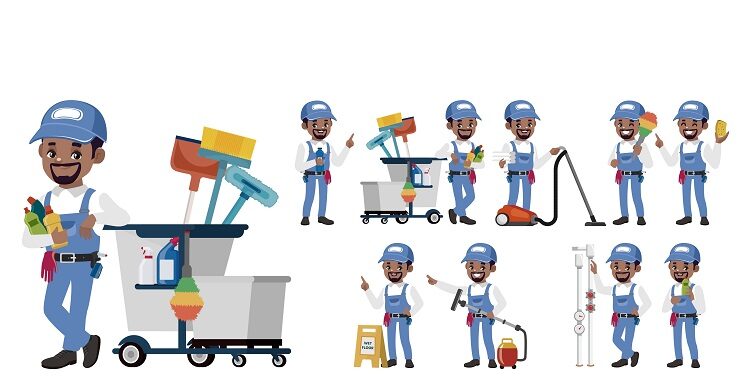
Clutter – that pile of things that never quite seems to have a place of its own – and mess is said to mirror the state of our minds.
A disorganized desk, for example, is an indication of a disorganized way of working and can increase your workday stress levels and trigger anxiety.
Spring-cleaning and decluttering, says Katrina Scott, has a way of stretching out your tired muscles in a fun way, getting your heart pumping just as exercise does, and decreasing your stress levels.
Katrina is a well-known American entrepreneur, YouTube influencer, fitness coach, author, and social media influencer with almost 800 thousand Youtube followers.
Here are 6 mental health benefits of decluttering:
- Use your decision-making and problem-solving skills to organize your workstation, boost your confidence, and improve your self-competency levels.
- Kick-start low energy levels by organizing your home and desk. The shift places you in a “get-things-done” kind of mood, which increases your productivity levels and helps sharpen your focus.
- Reduce the anxiety a messy environment naturally brings to your ways of working by creating order and balance.
- Decluttering and spring-cleaning give you a break from the job you have to do and can help boost innovative thoughts and ideas, just by breaking your focus on the problem at hand.
- Nothing stresses a family out more than a constantly-nagging mother or wife. Reduce tension and anxiety in your home life by removing the clutter and mess that forms the core of most of your arguments, especially now that everyone is forced to spend extended periods of time with each other during this global pandemic.
- Go on a treasure hunt. Remember that necklace you misplaced a year ago or the book you put down for just a minute but can’t find anymore? Find your lost treasures in the clutter around you and take back your spaces.
Use Proper Lighting
The brighter the light around us is, the more awake, aware, and present we feel.
This is because we’re not forced to squint to see.
The biggest benefit in making sure you have enough light to see your book, screen, or spaces around you is an active engagement in the task at hand while being able to also manage your eye health and mental well-being.
Your mental health can suffer as a result of poor lighting, as is often the case in winter months when the light around you is dimmer and somehow more depressing.
Lack of proper lighting in your home or office can disrupt your body’s circadian rhythm, which directly impacts your brain’s production of melatonin and serotonin.
A healthy and balanced amount of both these chemical hormones are critical to a good night’s sleep and your overall happiness, respectively.
Improve the light in your immediate environment by making sure your windows are clean, having an effective overhead light above your desk, and using a bedside lamp to prepare your body for bed at night.
Look After Your Back
The last place you want to be during a global pandemic is the ER, especially when an injury could have been prevented with the correct seating and posture habits.
Looking after your back has never made more sense than it does now.
To keep your back in tip-top shape, here are a few tips to ensure your back doesn’t spasm out on you:
- Get a good night’s rest. Sleeping the right amount has proven to put you in a better mood and to have more range of movement.
- Instead of just bending to pick an object up, bend your knees while standing as close as you can to the object.
- Don’t stay in one spot all day, move and walk around, even if it’s just right outside your front door or to make coffee. It has been proven that going for a walk or a run every day helps with your spine and exercises other joints and muscles, too.
- Don’t eat too much. Keeping a healthy diet and maintaining it is a great way to make sure you don’t hurt or break anything. Gaining weight can cause back pain and increase your chances of high blood pressure.
- Use the right chair. If the bulk of your day is forced to be managed in a chair, it is critically important that your workstation, chair, lighting, and overall ergonomics support the job you do. Learn more about ergonomics and the right chair for you here.
- Don’t ignore the signs. Your back health is critical to your ability to work from home in a way that promotes a healthy work-life balance. If you experience pain that lingers beyond your initial self-help techniques or over-the-counter pain medication, seek help from your medical practitioner immediately.
Walk Away From Your Workspace
Sit-Stand desks (also known as standing desks or height-adjustable desks) are used to alleviate the health risks associated with sitting too long, such as an office worker would do.
Standing desks counter the long-term effects of sitting, help to ease mild back pain, and are also said to aid in boosting productivity.
Sophia Amoruso, American businesswoman, entrepreneur, author, and the founder of Nasty Gal, recommends walking away from your workspace because it helps clear your mind and prepares you for the next task.
Whilst using a standing desk is not the same as taking regular breaks or walking away from your workspace, a short break from sitting all day – the way content writers do – still offers a bunch of health benefits that include lowered risk of heart disease, weight gain, and diabetes.
Pro tip: Alternate between sitting and standing in 3-hour stretches to burn more calories.
Do Enough Cardio And Healthy Activities
To avoid burnout and mental stress, regular exercise and being aware of your physical health at all times is the recommended way to maintain balance in both your work life and your personal life.
Burnout is caused by an overwhelming amount of stress, which is brought on by prolonged exposure to stressful events or environments.
It may sound counterintuitive to work up a sweat when you’re emotionally, physically, and mentally exhausted, but the mental health – and physical health – benefits of cardio and aerobic activities and regular exercise routines such as when cycling, gardening, swimming, dancing, or jogging include a reduced risk of chronic diseases, strengthened memory, increased respiratory fitness, and reduced anxiety and depression.
Reach Out To Coworkers
The Covid-19 pandemic brought with it social distancing, which includes distancing from others in a social setting.
Hybrid and isolated ways of working have resulted in higher productivity levels, yet lowered mental health levels.
FOMO, the fear of missing out, means people are hungrier than ever before for what social media can share with them to feed their loneliness and isolated ways of life.
If you’re missing the day-to-day camaraderie of working in a socialized working environment, consider reaching out to a coworker you feel you can trust when life gets a little overwhelming for you.
It may be that way for them right now, too.
Showing others how much you care about them is a great way to find out that you’re cared about, too.
And if you don’t feel comfortable talking to a coworker, there are a number of social workers out there waiting for your call to help you through your overwhelming and stressful situation and provide you with crisis counseling so you can find a healthy work-life balance.
Take A Relaxing Hot Bath
Nothing takes away the aches and pains of an honest day’s work like a long, hot shower or a deep, hot soak in the bathtub.
Uplift your spirit and mood by adding essential oils such as lavender or tea-tree, or add a scoop of bubbles to your bath with your favorite scented bubble bath.
Take the time alone to reflect and relax before bedtime, relieve muscle pain, boost your mood, prevent inflammation, and improve heart health.
Meditate
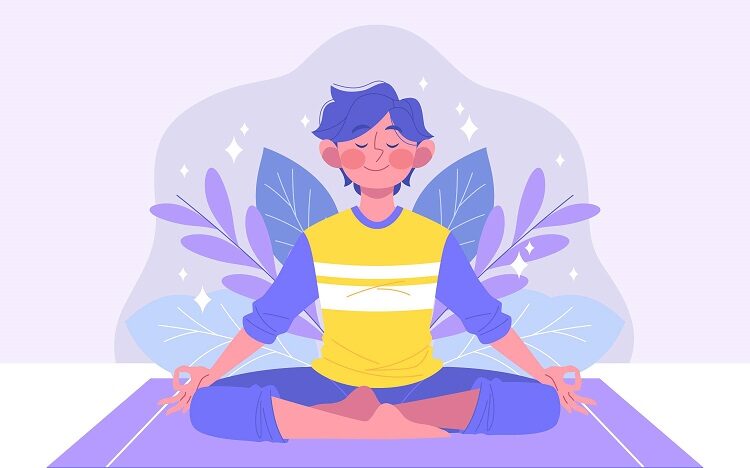
Meditation is the self-care practice of designing a quiet space around yourself so you have time to reflect and gain better perspectives on your stressors and opportunities.
Many celebrities, including Lady Gaga, Melinda Gates, Arianna Huffington, and Eva Mendes attribute their positive mental health to the meditation styles that work best for them, which are not all ums, ohms, and ahs.
For example, Angelina Jolie uses playtime with her kids to center and focus her mind.
Lena Dunham finds organization, happiness, and a feeling of being capable of facing both her internal and external challenges on a daily basis through meditation.
And Miranda Kerr uses yoga to detach from her demands and focus on her body, breathing, and what’s most important to her.
Clear Your Mind At The End Of The Day Using Journaling
Journaling is like having a paper-based memory drive that works a lot like downloading and saving your content to an external drive or to the cloud to help you preserve your memories, free up space for more, and categorize what you have.
The act of moving your content to a safe and accessible space gives you a feeling of relief, accomplishment, and control.
Journaling feels a lot like that, too.
Writing in your journal at the end of the day gives you a chance to offload the day’s stressors and accomplishments, track your progress on projects, monitor your health and triggers that may cause symptoms of medical issues, and prioritize the important things in your life.
Journaling reduces stress and anxiety by releasing the pent-up tension of the day, improves your immune function, keeps your memories safe, boosts your mood, and strengthens your mental and emotional core.
Separate “Work” Life And “Personal” Life
This is sometimes easier said than done when you work from home with small kids to look after, have a very demanding job, work across conflicting time zones, or need to dial infrequently to meet with diverse teams around the world.
That said, you pretty much know which hours are devoted to working, and which are not.
Make good use of your calendar to keep track of your personal “to-do” lists, such as kids’ soccer games, hair appointments, or get-togethers with your friends.
Using your scheduling app/calendar for both work and private life events lets you see at a glance what your whole day looks like (not just a portion of it) so you can plan better, be more present in those moments, and slot in free time when you need to.
Using Gmail?
Learn how to create multiple calendars in one account HERE.
Get Enough Restful Sleep
Using your mobile device at bedtime can disrupt your natural sleep patterns by suppressing melatonin, a hormone that regulates restful sleep, according to this 2017 study from the Journal of Child Development.
In addition to this, the messages sent across incompatible time zones may make you anxious about the work that lies ahead.
The good news is that it’s not all bad.
If you find that you simply can’t put down your phone at night, invest in a couple of good apps that help you meditate, offer white noise, or provide you with ways to maintain a journal of some sort.
You might be interested to check those related posts as well:
- Top 20 Work from Home Mental Health Tips [To Know] 2024
- 7 Popular Digital Nomads Self Care Tips [in 2024]
- Understanding a Self Care Wheel and Its Six Dimensions in 2024
FAQ
What is the most challenging part of working from home?
Loneliness and the inability to deal with stress, anxiety, and depression are some of the biggest mental health challenges that working from home can present to an individual.
How do you break the monotony of working from home?
There are many tips and tricks out there for coping and improving your mental health so you can have meaning and purpose, even though it sometimes doesn’t feel like it.
However, there is very little more inspiring, motivating, and uplifting for your soul than achieving a goal or learning a new skill.
What are some benefits of working from home?
Included amongst the top benefits of working from home is the commute time you gain back in a day, the uninterrupted focus and concentration you get to finish off tasks, the ability to work from anywhere, how much money you save in the long run, and the positive environmental impact of leaving less of a carbon footprint behind you than before.
Conclusion
Introverts and extroverts think and act differently, and working from home impacts both personality types differently.
Introverts tire easily when they’re amongst people for extended periods of time, and may therefore actually enjoy the time alone during extended isolation, whereas extroverts are likely to feel the pressure more when they’re unable to mingle.
Just how the Covid-19 crisis will affect us can only really be judged when all is said and done, yet it seems like the pandemic is here to stay for a while.
Be mindful of yourself and others, and remember that mental health is in most cases a personal choice made by you, to positively impact the way you see the world and your new reality, and to grow despite the negativity that surrounds you at this time.
